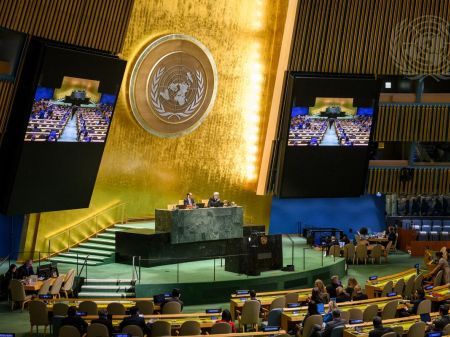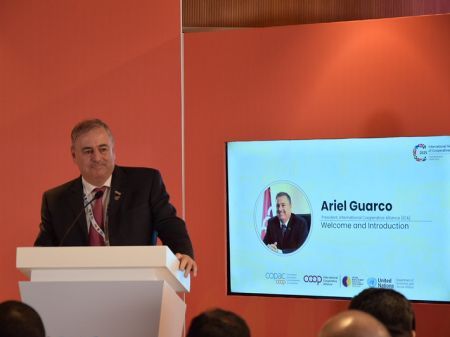
recommendations to the G20.
3 May 2017 - Representatives of co-operative businesses participated today in the B20 Summit in Berlin, Germany, preceding the G20 meetings in Hamburg this July. In their engagement throughout the past year with the B20 task forces, co-operatives called for greater inclusion of the co-operative perspective and for the recognition of their specific business model in B20 recommendations to the G20.
They reminded the B20 delegates of the size and impact of the global co-operative sector, citing from the 2016 edition of the World Co-operative Monitor, which shows 7% growth in turnover for the 300 largest co-operatives alone, aggregating over USD 2.5 trillion. 250 million people are employed by or organise their living through a co-operative.
Ms. Monique Leroux, President of the International Co-operative Alliance, stated "The hard work of the Alliance’s policy team has paid-off. We have increased the profile of co-operatives in global policy-making groups. I’m proud to have joined them in representing co-operatives as a co-chair of the SME group, where I witnessed first hand the influence our model has."
As a result of their participation, the final B20 policy papers providing recommendations to G20 governments, which became public at the conference in Berlin, contain several references to co-operatives. The policy paper on SMEs highlights the importance of the co-operative model. It reads: “SMEs might also help each other by combining their market power in a jointly-owned and jointly-managed structure, such as a co-operative. Commonly-owned structures like co-operatives might allow SMEs to maintain their independence and identity while at the same time delegating certain business functions (e.g. sourcing, marketing) to a larger entity that can negotiate better market conditions through the power of the collective. When formulating public policies for the development of SMEs, G20 governments should take into consideration the specificities of these structures and adapt regulations accordingly, that allow them to be established and to develop.”
Similarly, on the Employment and Education policy paper, the B20 states that “G20 governments should promote entrepreneurship as a way to boost self-employment by reducing administrative burdens related to the creation of business, and by promoting a diversity of business models, including cooperatives and other social economy enterprises. These allow people to mutualise risks, offering a good alternative for women, youth and other disadvantaged groups to access entrepreneurship.”
The B20 Summit took place in Berlin on 2-3 May under the motto “Resilience, Responsibility, Responsiveness – Towards a Future-oriented, Sustainable World Economy”. The purpose of the B20 Germany was to identify recommendations towards framework conditions that foster innovation, economic growth and job creation. Five taskforces focused on: Trade and Investment; Energy, Climate and Resource Efficiency; Financing Growth and Infrastructure; Digitization; and Employment and Education.
Monique Leroux, President of the International Co-operative Alliance, served as co-chair of the B20 Cross-Thematic Group for Small and Medium Enterprises (SMEs) and as a member of the Financing Growth and Infrastructure Taskforce. Alliance Director-General Charles Gould was a member of the Responsible Businesses group and the Digitalization Task Force. Andrew Crane, CEO of CBH group in Australia, was a member of the SME group. Rodrigo Gouveia, Alliance Director of Policy, was on the Employment and Education Taskforce and on the SMEs Coordination Group. Shaun Tarbuck, ICMIF chief executive, was also a member of the Financing Growth and Infrastructure Group, along with Teresa Rasmussen, President, Thrivent Financial. Thomas Stammen represented the German co-operative banking organisations. This year the B20 also created a ‘Health Initiative’ where co-operatives were represented by Carlos Zarco from the International Health Co-operative Organisation (IHCO), an Alliance sectoral organisation.
***ENDS***
About the International Co-operative Alliance
The International Co-operative Alliance is an independent, non-governmental organisation established in 1895 to unite, represent and serve co-operatives worldwide. The Alliance provides a global voice and forum for knowledge, expertise and co-ordinated action for and about co-operatives.
The members of the Alliance are international and national co-operative organisations from all sectors of the economy. The Alliance has members from over 100 countries, representing close to one billion individuals worldwide.
The International Co-operative Alliance publishes each year the World Co-operative Monitor. According to the 2016 edition of the Monitor (http://www.monitor.coop), the world’s 300 largest
co-operatives have over 2.5 trillion USD in turnover. Co-operatives generate partial or full-time employment for at least 250 million individuals worldwide, either in or within the scope of
co-operatives, making up almost 12% of the entire employed population of the G20 countries.
Contact: Rodrigo Gouveia, Director of Policy - gouveia@ica.coop




